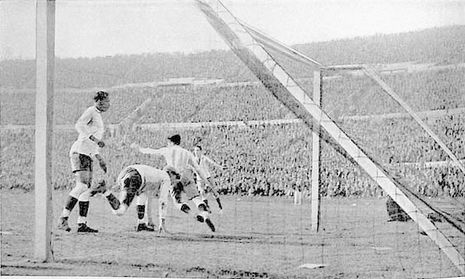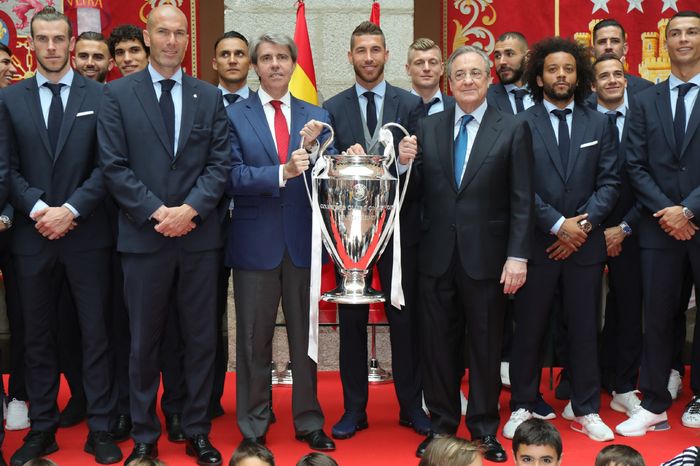The future of football: Envisioning the next century
Taking a step back from the game, Khalid Guma’a assesses the bigger picture and imagines the developments we may witness in the beautiful game.

On the 1st January 1921, Newcastle United thumped Manchester United 6-3 in what would be the highest-scoring first-division match of the 20-21 season. In the hundred years since, football has evolved into a very different game to the one played at St. James’ Park that day. Driven by developments in technology and injections of riches, the game continues to change at lightning speed. So, what might football look like in another hundred years?
The introduction of VAR has been rocky at best and, even when it is effective, it takes away from the excitement and spontaneity of football; celebrating a goal isn’t quite the same when you know it is still to be rigorously analysed for the smallest infractions. However, smooth integration of goal-line technology into the modern game offers an insight into the potential of technology in the sport. Referees wear microphones in rugby and players do the same in American football, although this is only possible due to their uniforms.
Given their success in these sports, it is difficult to rule out the introduction of similar crowd-pleasing technologies to football for the sake of entertainment. In fact, off the pitch, there has been a growing focus on providing better remote experiences for fans. Many clubs, especially in the Premier League have their own YouTube channels, showing fans exclusive footage and highlights usually not accessible during live games. The exciting developments in virtual reality technology will no doubt play a growing role in fans’ viewing of the sport over the century, sooner rather than later.
“The truth is, apart from the basic rules, football will be almost unrecognisable by the end of the century.”
Outside, financial influencers are starting to take more of an interest in football as a commercial or reputation-laundering opportunity. This includes Russian oligarch, and Chelsea owner, Roman Abramovic, and the attempted Saudi-backed takeover of Newcastle United. In the latter, the potential owners had a questionable involvement in appalling human rights abuses in the Middle East and likely saw the sport as a platform to remould their image – exactly the sort of political chess that should be kept firmly outside of the footballing world.
The introduction of political and financial interest, along with the commercial opportunities that appear with ever-increasing regularity in the modern era, mean that vast sums of money are now involved in transfer fees and wages. This leads to a gulf forming between high-earning players and their fans who, more often than not, earn a very ordinary wage. A growing disconnect between fans and players is a trend that we are sure to see over the century.
The money involved has also led to criticisms that players are no longer interested in ‘playing for the badge’ and instead are focussed on personal goals of wealth and individual acclaim; Joleon Lescott tweeting a picture of his £100,000 car immediately after a humiliating 0-6 home defeat a prime example of this. Nowadays, many fans feel that the focus of the sport is not on the events on the pitch, but on the events off it. A club is not doing well if it wins trophies; it is doing well if it can guarantee a large turnover during the next financial year.
Again, this contributes to a widening disconnect between players and fans and, ultimately, a change in the way fans interact with their club. This is mainly true of big clubs, which, in the 20th century, were hubs of local communities, but are now increasingly becoming sprawling global brands, tourist attractions and marketing opportunities. This is a situation that will disappoint many fans, but it is only another example of a modern society that is slowly losing its personal touch.
“Football is all too often a reflection of society, highlighting all the great things while reluctantly baring the ugly truths of its imperfections.”
Despite the clear drawbacks, football clubs being run as businesses can lead to positive changes in the game. Clubs are becoming more and more aware of their wider impact; many clubs now do charity work in their local communities. Continued kneeling before kick-off in support of the Black Lives Matter movement is a display of clubs’ understanding of their responsibility to facilitate constructive social change, previously viewed to be outside their remit. Players also continue to take on a greater role in social action, understanding the power of the combination of a familiar face and a relatable message. Marcus Rashford’s campaign in support of greater provisions of free school meals is an obvious example.
Money is also a facilitator of measures that protect and improve experiences for fans and players. The implementation of a rigorous Coronavirus testing scheme in the Premier League to ensure the safety of players and club staff is a prime example of a measure that would not be possible without reasonable financial backing. Clubs will continue to take a wider interest in social issues in coming years, investing funds to effect positive change within the game and in wider society.
On the pitch, the game itself is rapidly evolving. Tactically, there is more focus on structure in both formations and player movement. There is an increasing need to control and manage, reflective of the emotionless yet rational decision-making that you would expect to find within the pages of a company’s long-term strategy plans. Football is also being played with an increasing awareness of the strengths of the opposition (facilitated by improving access to technology, providing footage and statistics key to analysis); managers are starting to nullify opponent’s strengths and exploit their weaknesses rather than focus on those of their own team. This will likely lead to a limitation on the ability of individual players to impact games. Messi and Ronaldo figures, who can completely transform a team’s fortunes, will become rarer and rarer as the century progresses and the game evolves.
The truth is, apart from the basic rules, football will be almost unrecognisable by the end of the century. While very few people can argue that clubs supporting BLM or implementing COVID-19 testing are negative consequences, there is a concerning trend. From nullifying tactics to cash-rich owners who have little interest in what happens on the pitch, the exciting and unpredictable nature of the sport is beginning (and will continue) to dissipate. Football is all too often a reflection of society, highlighting all the great things while reluctantly baring the ugly truths of its imperfections. There will be winners, but all too often the loser is the fan, the individual. We can only hope that this isn’t reflected in the wider world.
 News / Cambridge academics sign open letter criticising research funding changes22 February 2026
News / Cambridge academics sign open letter criticising research funding changes22 February 2026 News / Student and union protesters hold ‘Trans Liberation Solidarity Rally’ 24 February 2026
News / Student and union protesters hold ‘Trans Liberation Solidarity Rally’ 24 February 2026 News / Union speakers condemn ‘hateful’ Katie Hopkins speech14 February 2026
News / Union speakers condemn ‘hateful’ Katie Hopkins speech14 February 2026 Features / Beyond the porters’ lodge: is life better outside college?24 February 2026
Features / Beyond the porters’ lodge: is life better outside college?24 February 2026 Theatre / Footlights Spring Revue? Don’t Mind if I Do!25 February 2026
Theatre / Footlights Spring Revue? Don’t Mind if I Do!25 February 2026








